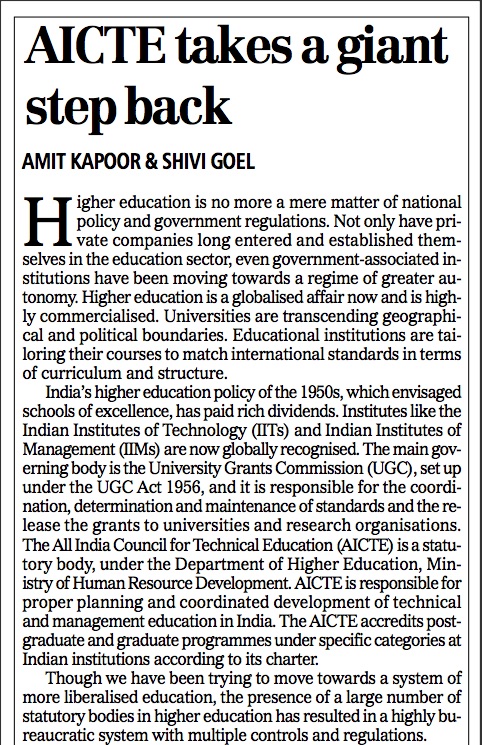| Higher education is no more a mere matter of national policy and government regulations. Not only have private companies long entered and established themselves in the education sector, even government-associated institutions have been moving towards a regime of greater autonomy. Higher education is a globalised affair now and is highly commercialised. Universities are transcending geographical and political boundaries. Educational institutions are tailoring their courses to match international standards in terms of curriculum and structure.India’s higher education policy of the 1950s, which envisaged schools of excellence, has paid rich dividends. Institutes like the Indian Institutes of Technology (IITs) and Indian Institutes of Management (IIMs) are now globally recognised. The main governing body is the University Grants Commission (UGC), set up under the UGC Act 1956, and it is responsible for the coordination, determination and maintenance of standards and the release the grants to universities and research organisations. The All India Council for Technical Education (AICTE) is a statutory body, under the Department of Higher Education, Ministry of Human Resource Development. AICTE is responsible for proper planning and coordinated development of technical and management education in India. The AICTE accredits postgraduate and graduate programmes under specific categories at Indian institutions according to its charter.Though we have been trying to move towards a system of more liberalised education, presence of a large number of Satutory Bodies in higher education has resulted in a highly Bureaucratic system with multiple controls and regulations.On December 28, 2010 AICTE issued a notification for regulating the Post Graduate Diploma in Management (PGDM) courses in the country. The notification includes eight points; most of them leading towards the greater role of respective state governments in the running of AICTE-approved PGDM/PGCM courses. The first point of the notification says, “All Post Graduate Diploma in Management (PGDM) shall be of duration of not less than 24 months.”
Management courses all over the world are offered in formats typically ranging from 12 to 21 months for full-time programmes. In a typical MBA programme, students are exposed to a common body of knowledge in basic accounting, economics, finance, human resources and organisation design, marketing, operations, policy and quantitative methods and statistics in the first year. And in the second year, students take specialised courses according to their preferences and strengths. MBA programmes tend to get shorter when incoming students have more managerial experience. Universities offer accelerated 12- to 15-month programmes for candidates who are already proficient in some of the industry-specific areas and have clearly-defined career paths.
AICTE’s recommendation of 24-month PGDM courses doesn’t base itself on valid rationale. There are many points that we should consider before jumping to such changes.
One of the underlying challenges is that the fee structure of all the institutes will be affected if such a change takes place because operating costs for three more months will have to be factored in. This is not feasible unless there is a fee increase.
Almost nowhere in the world is a full-time MBA course of 24 or more months offered. When we are trying to move towards a globalised and international education system, this will be an obvious digression. It might end up discouraging foreign students from taking up PGDM courses in India and will also affect the international brand and reputation of Indian colleges.
In many institutes, students go on exchange programmes to foreign institutes in the corresponding semesters. A 24-month programme in the home country and a 21-month programme abroad will clearly create a mismatch and impact the effectiveness of such exchange programmes.
Business schools are trying to pull in more and more work-experienced students; a longer-duration MBA course will significantly raise the opportunity cost associated with postgraduate courses. Students are likely to prefer some shorter- duration courses abroad or executive programmes in the country.
The present structure of PGDM courses is sufficient in terms of content and intensity. The 21 months even encompass a two- or three-month summer internship that gives students hands-on industry experience and helps them make more informed career decisions.
A shorter duration course always holds the incentive for the graduate that he/she will get back to work earlier and start earning earlier.
Last but not the least, a 21-month course gives the graduates a buffer period of one or two months before they actually enter industry. Such a break is sometimes necessary after a gruelling time at B-school.
So, just as we are trying to match international standards and make higher education more global, AICTE’s recommendations take us a step backward in the direction of regulations and control. Before taking any such steps, the long- term effects on the brand and quality of management education in India must be analysed. We are still far away from realising the dreams envisaged in 1950s.
The Article was published with Business Standard on February 26,2011.
|

